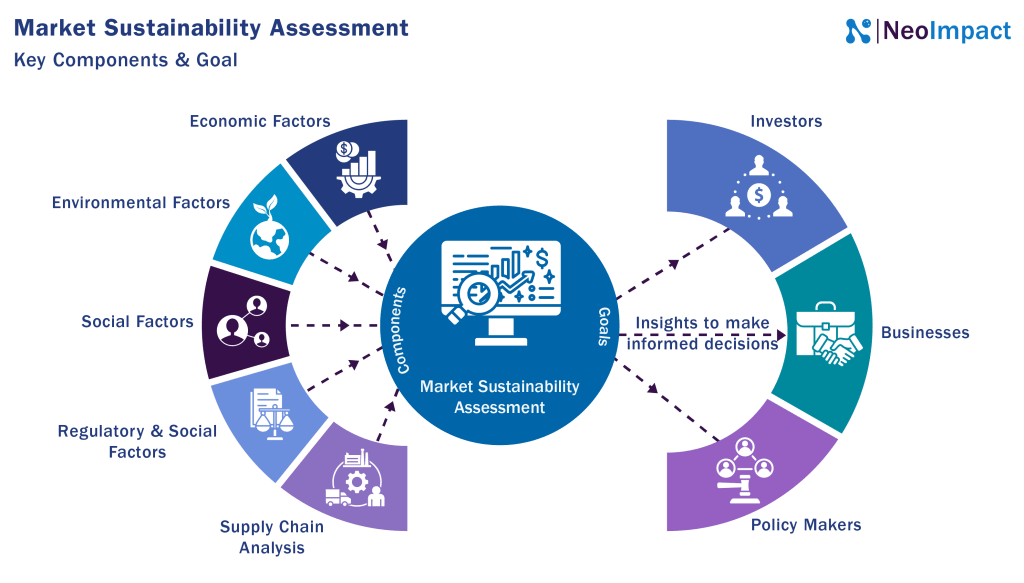What is Market Sustainability Assessment?
Markets are a fundamental part of an economy, and they play a pivotal role in allocating resources efficiently, promoting innovation, and providing consumers with choices. Understanding the dynamics of different markets is essential for businesses, investors, and policymakers as they make decisions related to production, consumption, & investment. Market Sustainability Assessment (MSA) or market viability assessment is one such process that helps evaluate & assess the long-term viability and resilience of a market or industry. The analysis determines whether a market can maintain its growth, profitability, and relevance over an extended period.
Within the ESG landscape, MSA scrutinizes the sustainability approaches taken by companies to address their operational and non-operational impacts on ESG. To improve ESG performance and prevent negative consequences on the environment, companies from different markets are constantly revisiting their ESG policies, programs, commitments, and progress.
NeoImpact’s recent MSA of the green fashion industry identifies that there is a lack of public policies in the industry to assist manufacturers in adopting environmentally friendly practices for processing and manufacturing goods. In another MSA of the green aviation industry, we found that there is growing investment in green aviation across the world, primarily in the European region, in line with the European Union’s climate-neutrality target for 2050. In 2022, Spanish firm Cepsa announced a USD 3.2 billion investment into the production and transportation of SAFs.
Importance of Market Sustainability Analysis
Market sustainability analysis is highly relevant in today’s economy due to the growing awareness of ESG factors and their impact on businesses & financial markets. Sustainability analysis of any market enables the stakeholders to identify and assess various ESG-related risks that can affect the players in the long run. Risk management through market sustainability analysis includes a study on climate change risks, supply chain disruptions, regulatory changes, and reputational risks. Therefore, sustainability analysis is gaining traction as it provides resilience from long-term risks to different stakeholders.

Key components of market sustainability assessment typically include economic factors, environmental factors, social factors, regulatory & legal factors, and supply chain analysis. The goal of market sustainability analysis is to help businesses, investors, and policymakers make informed decisions by understanding the factors that can influence a market’s long-term viability. By identifying strengths and weaknesses in these areas, organizations can develop strategies to mitigate risks and capitalize on opportunities for sustainable growth. The above factors can easily be divided into subfactors or key performance indicators, such as GDP growth, carbon emissions, community well-being, the market’s adaptability to technological changes, and investments in research & development, which can help map the overall sustainability health of a particular geographical market or industry.
How Market Sustainability Analysis Adds Value to Your Company
- Corporations and businesses: Companies across different industries seek market sustainability analysis to understand the long-term viability and resilience of the markets in which they operate. This information can help them make strategic decisions, adapt to changing market conditions, and ensure that their business practices align with sustainability goals & consumer demands.
- Academic institutions: Universities, research centers, and educational institutions may seek consulting services to support research projects, curriculum development, and sustainability-focused initiatives.
- Supply chain companies: Suppliers, manufacturers, and logistics companies use MSAs to optimize their supply chain operations for sustainability, assess environmental & social risks, and ensure compliance with industry standards.
How NeoImpact Can Help
Consulting offerings on market sustainability analysis can be tailored to meet the specific needs of organizations across various sectors. These offerings may include a combination of services and solutions designed to help clients understand, implement, and excel in sustainability practices. NeoImpact provides market sustainability analysis to various clients in the form of targeted research focused on varied business sustainability topics.
ESG/Sustainability thematic reports
NeoImpact has embarked on the journey of providing market sustainability analysis inclusive of sustainability best practices, global perspectives, regulatory framework, benchmarking, and SWOT analysis. These reports can be categorized based on geographical markets, industry, communities, and product types, among others.
ESG Industry benchmarking
NeoImpact’s proprietary taxonomy integrates more than 300 KPIs across ESG categories and incorporates several sustainability frameworks to analyze the sustainability of key companies operating in a market. NeoImpact’s focus is across several mainstream and niche sectors including green fashion, microfinance, electric passenger vehicle, and dietary supplement, among others.
Data collection training for market sustainability analysis
NeoImpact can run training programs to empower corporates to analyze the best ESG practices in their respective industries. These training courses can target corporations willing to develop their own ESG teams to lead ESG integration & strategy development, for which data collection is crucial.
Regulatory framework guide
NeoImpact holds the potential to publish various regulatory framework guides specific to regions as well as the global market.
Market research and analysis
NeoImpact provides specific in-depth market research to gather data on economic, environmental, social, and technological factors affecting the market. This can include research on historical trends as well as emerging opportunities & trends. Market research and analysis also help in identifying key market drivers, challenges, & competitive forces.
Environmental and social impact assessments
Under market sustainability analysis, an organization can utilize environmental and social assessment as a guiding document to analyze the impact of the respective industry. NeoImpact offers a comparative study of how an organization can reduce its share as part of the impact of the industry through company sustainability reports or impact reports.
Technology and innovation landscape
This research can be targeted at analyzing the technological landscape within the market and identifying emerging technologies & their potential impact.
